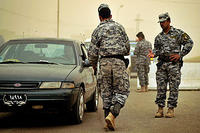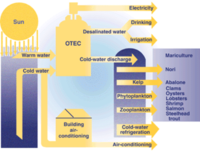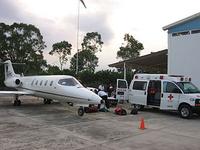-
U.K. businessman convicted of selling fake explosives detectors

James McCormick, a British businessman, was convicted of having made millions in profits from selling fake bomb detectors to Iraq, Georgia, and several other countries. McCormick bought $20 golf ball finders in the United States, then sold the devices, which had no working electronics, for $40,000 each. The Iraqi government used more than $40 million in U.S. aid money to buy 6,000 of the devices, despite being warned by the U.S. military that the devices were a sham. The Iraqi military used the fake detectors at check-points, leading to scores of soldiers and civilians being killed by suicide trucks which went through the check points undetected. The police in Kenya says it will continue to use the devices.
-
-
California considering lead ammo ban

Health and environmental advocates are trying to make California the first state to enforce a statewide ban on the use of lead bullets for hunting. The U.S. Geological Survey (USGS) estimates that there are 400,000 pieces of lead shot per acre in wild game territory which can be eaten or washed into rivers and waterways. The USGS also says that 60,000 metric tons of lead fired off last year is the second largest use of lead in the United States behind batteries. The CDC reports that lead is so abundant in meat harvested through hunting, that pregnant woman and children should never eat it. The NRA opposes the ban, saying it could possibly the end of hunting in California.
-
-
Volatility of food prices is still a mystery
Riots, political instability, and a spike in malnourishment cases blighted the years 2007 and 2008, particularly in developing countries. The cause was a sudden surge in global food prices, with rice eventually rising several hundred per cent as importing countries simply could not get enough of this basic foodstuff.Food market volatility has yet to be understood, and there is no definite proof that it is due to speculators.
-
-
White House to take a second look at FAA furloughs

The White House hinted Wednesday that it could accept legislation which would end Federal Aviation Administration (FAA) furloughs. Passengers have been in arms over lengthening flight delays and a growing number of flight cancellations, while GOP lawmakers accused the FAA of implementing the sequester-mandated budget cut in such a way so as to cause maximum inconvenience to passengers.
-
-
EPA slams State Department’s Keystone XL pipeline review
The Environmental Protection Agency (EPA) on Monday criticized the State Department’s environmental impact review of the Keystone XL pipeline, saying there was not enough evidence to back up key conclusions in the review on emissions, safety, and alternative routes. The EPA’s comments could have a negative effect on the approval of the project, but if the project is approved, the comments could serve as supporting evidence in any ligation against the pipeline.
-
-
McCaul to draft cybersecurity bill
House Homeland Security chairman Michael McCaul (R-Texas) said he was drafting his own cybersecurity bill, which will define the role of DHS in sharing information with private companies about cyber threats. McCaul hopes to agree on a compromise with the White House, which threatened to veto the bill.
-
-
Ocean thermal energy conversion power plant to be built off southern China’s coast

Lockheed Martin has announced that it is working with Chinese company Reignwood Group to develop an Ocean Thermal Energy Conversion (OTEC) pilot power plant off the coast of southern China. The prototype plant will be the first project in the multi-billion dollar clean energy agreement between the two companies. OTEC takes the natural temperature difference found in the ocean in tropical regions and uses it to create power. This technology is well-suited to island and coastal communities.
-
-
U.S. hospitals shipping sick immigrants back to their home countries

Hundreds of immigrants who are in the United States illegally end up in the hospital only to find out they will be sent home through a removal system run by hospitals trying to avoid the high cost of treating illegal immigrants.
-
-
N.Y. lawmakers oppose proposed hikes in U.S.-Canada border crossing fees
The U.S. government is considering charging a new fee for every vehicle or pedestrian crossing the U.S.–Canada border. This has upset lawmakers in New York who argue the toll would hurt trans-boundary commerce and undermine efforts to ease the flow of traffic and goods between the two countries. Moreover they suggest that the real purpose of the proposed fees is to subsidize the more expensive security operations along the U.S.-Mexico border.
-
-
FAA furloughs begin with impact on flights slight so far
Sunday was the first day of FAA furloughs, but commercial airline flights ran smoothly throughout the country. There were delays in New York area airports, but nothing that was considered significant. There were also delays in Florida, but they were caused by thunderstorms.
-
-
Ammonium nitrate fertilizers are inherently risky, but the benefits are many
The deadly explosion has brought the $10 billion U.S. fertilizer industry to the attention of the mainstream media, but the risks inherent in fertilizer production and storage are not a secret to people close to the industry. Ammonium nitrate may be dangerous, but its benefits cannot be ignored.
-
-
Hagel reassures Israel, discusses large arms deal
U.S. Defense Secretary Chuck Hagel arrived in Israel Sunday for his first visit in the country as secretary of defense. Some elements in the pro-Israel lobby in the United States campaigned against Hagel’s nomination, and Hagel went out of his way to assure Israelis that his position on Israel is not what it was portrayed to be. One of the main reasons for Hagel’s visit is to discuss a major U.S. arms deal that would offer Israel missiles for its fighter aircraft – but also plus KC-135 refueling planes which could be used in a long-range strike on a country such as Iran. Until now, the United States refused to sell refueling tankers to Israel.
-
-
Airlines ask court to stop FAA furloughs
The FAA’s annual budget is $16 billion. As part of the sequester, the agency must reduce its budget by $637 million between now and the end of September. The agency says that the only way it can achieve these saving is by imposing a 2-week furlough on its 47,000 employees – including 15,000 air traffic controllers. A coalition of U.S. airlines has petitioned a federal court to stop the furloughs, which began yesterday, saying they would leas to the cancellation of 6,700 flights a day.
-
-
Reinvestment in U.S. water infrastructure should be a top national priority
The U.S. water infrastructure is often called the “invisible infrastructure” – a vast, largely invisible network of pipes and tunnels — nearly 1.4 million miles span across the United States, which is eight times the length of the U.S. highway system. Much of the U.S. infrastructure was built more than a century ago, and currently around 10 percent of these systems are at the end of their service life. If not addressed by 2020, this number could rise to 44 percent. A summit meeting of the U.S. water community calls on Congress to make water infrastructure a top national priority.
-
-
Interior Dept. releases progress report on U.S. Water Census
The U.S. Interior Department issued released a report to Congress on the progress of the National Water Census. As competition for water grows — for irrigation of crops, for use by cities and communities, for energy production, and for the environment — the need for the National Water Census and related information and tools to aid water resource managers also grows. The Water Census will assist water and resource managers in understanding and quantifying water supply and demand, and will support more sustainable management of water resources.
-
More headlines
The long view
Factories First: Winning the Drone War Before It Starts
Wars are won by factories before they are won on the battlefield,Martin C. Feldmann writes, noting that the United States lacks the manufacturing depth for the coming drone age. Rectifying this situation “will take far more than procurement tweaks,” Feldmann writes. “It demands a national-level, wartime-scale industrial mobilization.”
Trump Is Fast-Tracking New Coal Mines — Even When They Don’t Make Economic Sense
In Appalachian Tennessee, mines shut down and couldn’t pay their debts. Now a new one is opening under the guise of an “energy emergency.”
Smaller Nuclear Reactors Spark Renewed Interest in a Once-Shunned Energy Source
In the past two years, half the states have taken action to promote nuclear power, from creating nuclear task forces to integrating nuclear into long-term energy plans.
